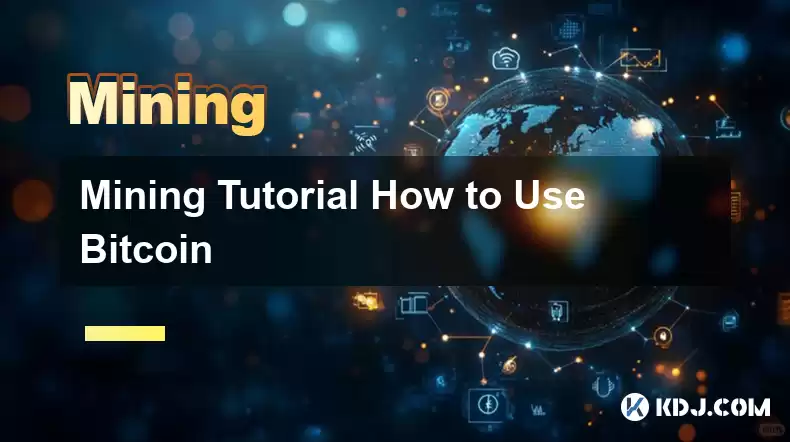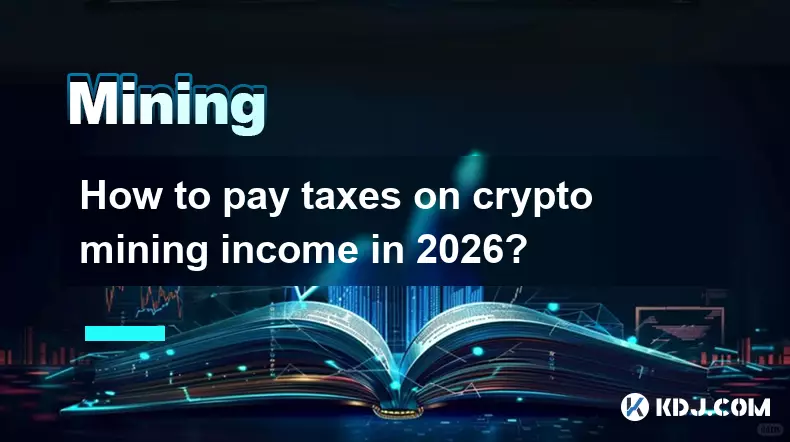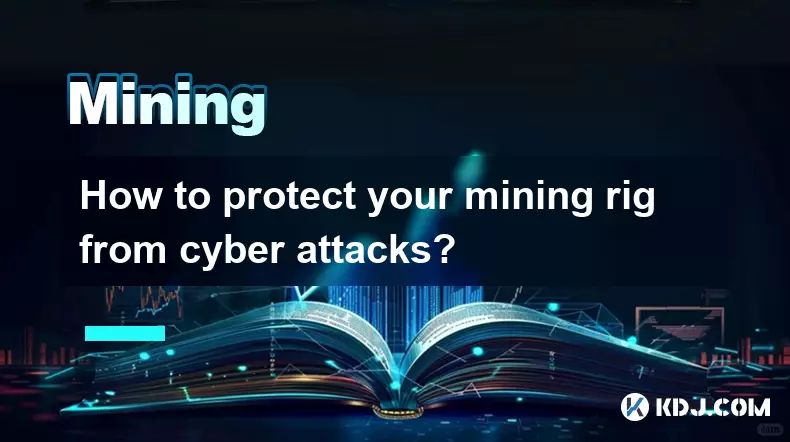-
 bitcoin
bitcoin $87959.907984 USD
1.34% -
 ethereum
ethereum $2920.497338 USD
3.04% -
 tether
tether $0.999775 USD
0.00% -
 xrp
xrp $2.237324 USD
8.12% -
 bnb
bnb $860.243768 USD
0.90% -
 solana
solana $138.089498 USD
5.43% -
 usd-coin
usd-coin $0.999807 USD
0.01% -
 tron
tron $0.272801 USD
-1.53% -
 dogecoin
dogecoin $0.150904 USD
2.96% -
 cardano
cardano $0.421635 USD
1.97% -
 hyperliquid
hyperliquid $32.152445 USD
2.23% -
 bitcoin-cash
bitcoin-cash $533.301069 USD
-1.94% -
 chainlink
chainlink $12.953417 USD
2.68% -
 unus-sed-leo
unus-sed-leo $9.535951 USD
0.73% -
 zcash
zcash $521.483386 USD
-2.87%
Mining Tutorial How to Use Bitcoin
Understanding Bitcoin's underlying blockchain technology and the different mining hardware options, such as ASICs, is crucial for optimizing mining profits and efficiency.
Jan 13, 2025 at 07:55 am

- Understanding Bitcoin and its underlying technology
- Selecting a suitable mining hardware
- Setting up a mining pool or joining an existing one
- Configuring and running mining software
- Optimizing mining efficiency and profitability
- Troubleshooting common mining issues
Bitcoin is a decentralized cryptocurrency that operates on blockchain technology. It is secured by a distributed network of computers known as "miners." Miners process transactions and add them to the blockchain, the public ledger that stores all Bitcoin transactions.
To participate in Bitcoin mining effectively, it is crucial to understand the core concepts of Bitcoin, including its blockchain structure, transaction verification process, and the role of miners in maintaining the network's security.
2. Selecting a Suitable Mining HardwareThe choice of mining hardware is critical to the success of a mining operation. There are several types of mining hardware available, each with its own characteristics and performance capabilities.
- CPU Mining: Uses your computer's central processing unit (CPU) for mining. It is the most basic form of mining and no longer profitable for Bitcoin mining.
- GPU Mining: Utilizes graphical processing units (GPUs), which offer significantly higher performance than CPUs for mining.
- ASIC (Application Specific Integrated Circuit) Mining**: ASICs are specialized hardware designed specifically for mining cryptocurrencies. They provide the highest performance but also come with a higher cost.
Consider factors such as power consumption, hashrate (mining speed), and cost when selecting your mining hardware.
3. Setting Up a Mining Pool or Joining an Existing OneMining Bitcoin independently is no longer feasible due to the immense computational power required. Most miners participate in mining pools, which combine the resources of multiple miners to increase their chances of finding a block.
To participate in a mining pool:
- Research and select a reputable mining pool.
- Create an account on the mining pool and download its mining software.
- Configure the mining software according to the pool's instructions and start mining.
The mining software acts as an interface between your mining hardware and the mining pool. It allows you to control various mining parameters and monitor its performance.
- Download the mining software from your chosen mining pool or develop your own.
- Configure the software settings, including your mining hardware configuration, pool connection details, and desired mining intensity.
- Start the mining software and monitor its operations.
To maximize your mining profits, it is essential to optimize your mining setup:
- Fine-tune your mining software settings to maximize efficiency and stability.
- Overclock your mining hardware if possible, while monitoring its temperature and stability.
- Join a mining pool with low fees and a reliable track record.
- Monitor your mining rig regularly and replace any faulty components promptly.
Mining operations can encounter various issues, including:
- Overclocking Failures: Ensure your hardware is stable at the overclocked settings. Too much overclocking can cause instability and damage to your equipment.
- Software Errors: Update your mining software and drivers to the latest versions to resolve software-related issues.
- Pool Connectivity Problems: Check your internet connection and confirm that your mining pool is online and accessible.
- Hardware Issues: Run diagnostics on your mining hardware to identify and replace any faulty components.
- Is Bitcoin mining still profitable?Profitability depends on factors such as mining difficulty, network hashrate, electricity costs, and the value of Bitcoin. It can fluctuate significantly, so research thoroughly before investing in mining equipment.
- Can I solo mine Bitcoin?Solo mining, attempting to mine Bitcoin blocks independently, is highly unlikely to be profitable due to the immense computational power required. Joining a mining pool is recommended to increase your chances of success.
- What is the hashrate?The hashrate is a measure of the computational power of a mining network or individual miner. A higher hashrate increases the probability of solving the complex mathematical problems required for mining blocks.
- Can I mine Bitcoin with my home computer?CPU mining with a home computer is no longer viable due to low efficiency and profitability. GPU mining can be an option, but it is crucial to consider electricity costs and ensure your graphics card is powerful enough.
- What is an ASIC miner?An ASIC (Application Specific Integrated Circuit) miner is a specialized hardware designed solely for cryptocurrency mining. They provide significantly higher performance and efficiency than general-purpose computation.]
Disclaimer:info@kdj.com
The information provided is not trading advice. kdj.com does not assume any responsibility for any investments made based on the information provided in this article. Cryptocurrencies are highly volatile and it is highly recommended that you invest with caution after thorough research!
If you believe that the content used on this website infringes your copyright, please contact us immediately (info@kdj.com) and we will delete it promptly.
- Dogecoin, Meme, and Opportunity: Riding the Volatile Waves of the Original Meme Coin
- 2026-02-08 13:00:02
- Crypto Market Roars: Lagrange Surges Over 80% Amidst Talk of Eye-Popping 678% Pumps
- 2026-02-08 12:35:01
- Bitcoin Navigates Deep Conviction Zone as Smart Money Quietly Accumulates
- 2026-02-08 12:55:01
- Bithumb's Bitcoin Blunder: South Korea's Crypto Transfer Chaos and Market Volatility
- 2026-02-08 12:55:01
- Penny Value, Precious Metals, and Coin Clubs: A Collector's Rollercoaster Ride
- 2026-02-08 10:00:02
- Dogecoin's Meme-Coin Renaissance: Lunar Dreams Collide with Crypto Realities
- 2026-02-08 10:10:02
Related knowledge

How to mine crypto sustainably in 2026?
Feb 07,2026 at 04:20pm
Energy Source Optimization1. Miners increasingly deploy solar arrays directly on warehouse rooftops to power ASIC rigs during daylight hours. 2. Geoth...

How to mine Conflux on a standard gaming laptop?
Feb 07,2026 at 04:19am
Hardware Requirements for Conflux Mining1. Conflux uses a proof-of-work consensus mechanism called Tree-Graph, which is designed to be ASIC-resistant ...

How to mine Flux with a 30-series Nvidia GPU?
Feb 07,2026 at 02:40pm
Market Volatility Patterns1. Bitcoin price movements often exhibit sharp intraday swings exceeding 5% during low-liquidity windows, particularly betwe...

How to pay taxes on crypto mining income in 2026?
Feb 07,2026 at 01:20am
Tax Classification of Mining Rewards1. Cryptocurrency received as mining rewards is treated as ordinary income by most major tax jurisdictions includi...

How to find the lowest fee mining pools for BTC?
Feb 07,2026 at 01:00pm
Fee Structure Transparency1. Most reputable BTC mining pools publish their fee schedules directly on their official websites, often under sections lab...

How to protect your mining rig from cyber attacks?
Feb 05,2026 at 09:40pm
Secure Firmware Updates1. Always verify the digital signature of firmware before installation to ensure authenticity and integrity. 2. Disable automat...

How to mine crypto sustainably in 2026?
Feb 07,2026 at 04:20pm
Energy Source Optimization1. Miners increasingly deploy solar arrays directly on warehouse rooftops to power ASIC rigs during daylight hours. 2. Geoth...

How to mine Conflux on a standard gaming laptop?
Feb 07,2026 at 04:19am
Hardware Requirements for Conflux Mining1. Conflux uses a proof-of-work consensus mechanism called Tree-Graph, which is designed to be ASIC-resistant ...

How to mine Flux with a 30-series Nvidia GPU?
Feb 07,2026 at 02:40pm
Market Volatility Patterns1. Bitcoin price movements often exhibit sharp intraday swings exceeding 5% during low-liquidity windows, particularly betwe...

How to pay taxes on crypto mining income in 2026?
Feb 07,2026 at 01:20am
Tax Classification of Mining Rewards1. Cryptocurrency received as mining rewards is treated as ordinary income by most major tax jurisdictions includi...

How to find the lowest fee mining pools for BTC?
Feb 07,2026 at 01:00pm
Fee Structure Transparency1. Most reputable BTC mining pools publish their fee schedules directly on their official websites, often under sections lab...

How to protect your mining rig from cyber attacks?
Feb 05,2026 at 09:40pm
Secure Firmware Updates1. Always verify the digital signature of firmware before installation to ensure authenticity and integrity. 2. Disable automat...
See all articles










































































